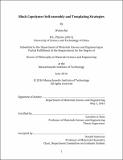Block copolymer self-assembly and templating strategies
Author(s)
Bai, Wubin
DownloadFull printable version (9.557Mb)
Other Contributors
Massachusetts Institute of Technology. Department of Materials Science and Engineering.
Advisor
Caroline A. Ross.
Terms of use
Metadata
Show full item recordAbstract
Block copolymers microphase separate to form periodic patterns with period of a few nm and above without the need for lithographic guidance. These self-assembled nanostructures have a variety of bulk geometries (alternating lamellae, gyroids, cylinder or sphere arrays, tiling patterns, core-shell structures) depending on the molecular architecture of the polymer and the volume fraction of its blocks. And in thin films, surface interaction and commensurability effect influence the self-assembly and result in more diverse morphologies including hexagonal-packed perforated lamellae, square array of holes. The progress of self-assembly can be tracked in situ using Grazing Incidence Small Angle X-ray Scattering, and the annealed morphology can be revealed in 3D using TEM tomography. Moreover, non-bulk morphologies can be produced, the ordering of the microdomains can be improved and their locations directed using various templates and processing strategies. The blocks can themselves constitute a functional material, such as a photonic crystal, or they can be used as a mask to pattern other functional materials, functionalized directly by various chemical approaches, or used as a scaffold to assemble nanoparticles or other nanostructures. Block copolymers therefore offer tremendous flexibility in creating nanostructured materials with a range of applications in microelectronics, photovoltaics, filtration membranes and other devices.
Description
Thesis: Ph. D., Massachusetts Institute of Technology, Department of Materials Science and Engineering, 2016. This electronic version was submitted by the student author. The certified thesis is available in the Institute Archives and Special Collections. Cataloged from student-submitted PDF version of thesis. Includes bibliographical references.
Date issued
2016Department
Massachusetts Institute of Technology. Department of Materials Science and EngineeringPublisher
Massachusetts Institute of Technology
Keywords
Materials Science and Engineering.